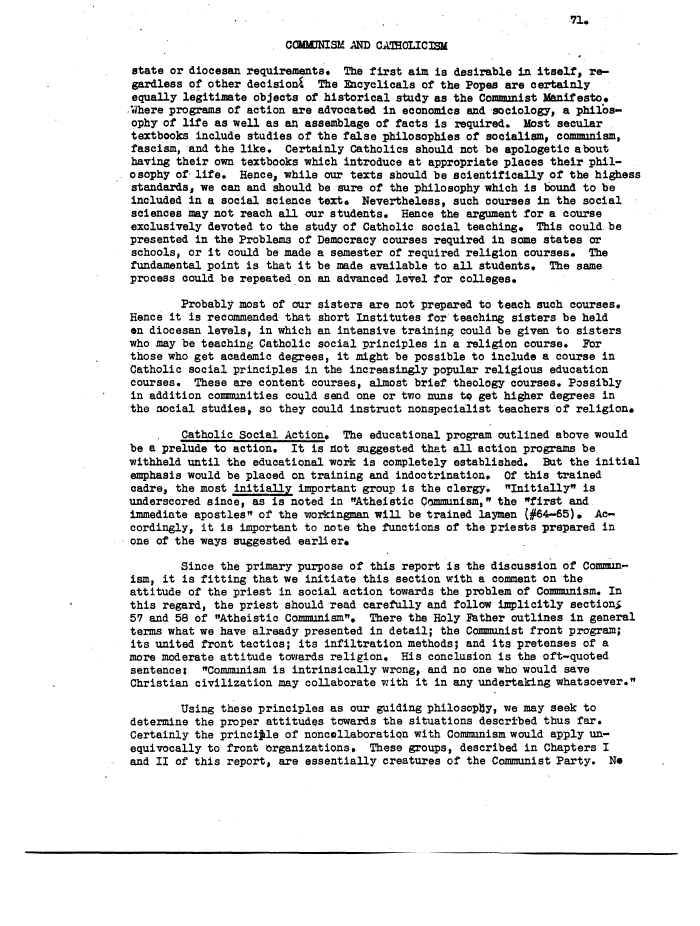 |
||||
 |
||||
| . 71. COMMDNISM AND CA3HOLIC3SM state or diocesan requirements* The first aim is desirable in itself, re- gardless of other decision^ The Encyclicals of the Popes are certainly equally legitimate objects of historical study as the Communist Manifesto* Where programs of action are advocated in economics and sociology, a philos- ophy of life as well as an assemblage of facts is required* Host secular textbooks include studies of the false philosophies of socialism, communism, fascism, and the like* Certainly Catholics should not be apologetic about having their own textbooks which introduce at appropriate places their phil- osophy of life* Hence, while our texts should be scientifically of the highess standards, we can and should be sure of the philosophy which is bound to be included in a social science text* Nevertheless, such courses in the social sciences may not reach all our students* Hence the argument for a course exclusively devoted to the study of Catholic social teaching. This could be presented in the Problems of Democracy courses required in some states or schools, or it could be made a semester of required religion courses. The fundamental point is that it be made available to all students* The same process could be repeated on an advanced level for colleges. Probably most of our sisters are not prepared to teach such courses. Hence it is recommended that short Institutes for teaching sisters be held on diocesan levels, in which an intensive training could be given to sisters who may be teaching Catholic social principles in a religion course* For those who get academic degrees, it might be possible to include a course in Catholic social principles in the increasingly popular religious education courses. These are content courses, almost brief theology courses. Possibly in addition communities could send one or two nuns to get higher degrees in the aocial studies, so they could instruct nonspecialist teachers of religion* Catholic Social Action. The educational program outlined above would be a prelude to action. It is hot suggested that all action programs be withheld until the educational work is completely established. But the initial emphasis would be placed on training and indoctrination* Of this trained cadre, the most initially important group is the clergy. "Initially" is underscored since, as is noted in "Atheistic Communism," the "first and immediate apostles" of the workingman will be trained laymen (#64-65). Ac~ cordingly, it is important to note the functions of the priests prepared in one of the ways suggested earlier* Since the primary purpose of this report is the discussion of Commun- ism, it is fitting that we initiate this section with a comment on the attitude of the priest in social action towards the problem of Communism. In this regard, the priest should read carefully and follow implicitly section> 57 and 58 of "Atheistic Communism". There the Holy Eather outlines in general terms what we have already presented in detail; the Communist front pro-gram; its united front tactics; its infiltration methods; and its pretenses of a more moderate attitude towards religion. His conclusion is the oft-quoted sentence; "Communism is intrinsically wrong, and no one who would save Christian civilization may collaborate with it in any undertaking whatsoever." Using these principles as our guiding philosophy, we may seek to determine the proper attitudes towards the situations described thus far. Certainly the principle of nonce llabor at ion with Communism would apply un- equivocally to front 'organizations. These groups, described in Chapters I and II of this report, are essentially creatures of the Communist Party. N« |